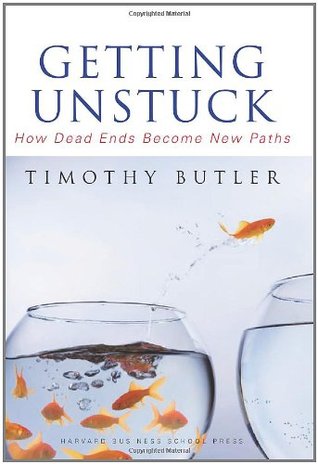Getting Unstuck Summary
6 min read ⌚

How Dead Ends Become New Paths, aka A Guide to Discovering Your Next Career Path
Feeling stuck in life? Regardless of what you do, you can’t make any move in the right direction?
Probably you’re at an impasse. And in “Getting Unstuck,” Timothy Butler has the upside for you!
He thinks that dead ends are not traps, but open doors.
And, to a better life, mind you!
Who Should Read “Getting Unstuck”? And Why?
To get to the crux of the matter from the start: “Getting Unstuck” is for people who have reached a state of impasse in their lives. It’s a book about those who can’t get over a work crisis. And, certainly, something anyone feeling unhappy with how his life turned out to be would like to read.
About Timothy Butler
Timothy Butler , Ph.D., is a Senior Fellow and Director of the Career Development Program at Harvard Business School. He is one of the world’s foremost career decision making experts, having authored numerous articles and few books on the subject.
, Ph.D., is a Senior Fellow and Director of the Career Development Program at Harvard Business School. He is one of the world’s foremost career decision making experts, having authored numerous articles and few books on the subject.
In addition to “Getting Unstuck,” he has also co-authored with James Waldroop “The 12 Bad Habits That Hold Good People Back” and “Discovering Your Career In Business.”
“Getting Unstuck Summary”
Have you ever heard of Rainer Maria Rilke?
If not, here’s a good place to find out a thing or two about him and one of his most famous poems.
You see, Rainer Rilke was a great German poet, possibly the most beloved foreign author in the English-speaking world. He wrote mystical poems about nostalgia, the ineffable, and the power of poetry to triumph over the ephemeral.
(We know we did get a little wordy there, but, hey – don’t you know it, Rilke was a poet!)
But, he wasn’t always like that. He was much more intellectual and science-oriented when he started off.
And, then it happened!
He visited the Louvre and happened upon a beautiful statue of the Greek god Apollo. The only thing missing from it – its head. Being a poet, he contemplated the headless torso in solitude a while. And then he wrote one of the most quoted poems in any language.
He suddenly realized that he was walking on the wrong path throughout his whole life. And he felt as if the headless, mindless statue spoke to him. Half a line, five words, to echo through all times:
God, that gives us shivers every time we read it. Do you feel the same way too?
Well, it might be that you’re in the middle of a psychological impasse. Meaning: you don’t know how to make the next step from here.
And, since we’re creatures of habits, the chances are, no matter how difficult and unfulfilling your life is at the moment, you won’t take the risk of changing it.
That’s not good. It’s the exact same thing which makes abused girls grow into becoming abusers’ wives. The place is bad, but at least it’s known. That – right there – that is the cause of most of your problems!
Unchartered territories are not for rookies only. They are for everyone who wants to get to know himself.
So, do that. Stop slaving to the orders of hat voice in your head telling you to stay put. Sigmund Freud called it the “superego”, and William Blake called it “the accuser.”
Timothy Butler calls it “a dead end.” And he has few exercises to help you get unstuck from it.
We have them for you as well – in our “Key Lessons” section!
Key Lessons from “Getting Unstuck”
1. Know Thyself, Part 1: the “Free Attention” Exercise
2. 100 Jobs and 10 Personalities: Which Ones Best Define You?
3. Know Thyself, Part 2: The Three Social Motivators
Know Thyself, Part 1: the “Free Attention” Exercise
What Rilke experienced in the Louvre was something artists call an epiphany! And you can too – right now! Especially if you’re in a crisis!
Start by sitting comfortably and straight in a chair. Place your feet on the floor. Next, put your hands in your lap, and fix your gaze in front of you. Focus on your sensations, while letting them run their own course.
Now, focus your eyes on your palm and think only of it for some period of time. May your hand be your entire world. Do the same with your knee cap. Breathe.
In a while, you’ll realize that your thoughts are interfering with your vision. Keep focusing until they disappear. Suddenly, you’ll feel some sadness and anxiety. Don’t fight it: it’s good. It means that your ego, your nemesis, has just retreated.
Now, you’re all alone with yourself.
And your self wants to tell you something.
Do you hear it:
“You must change your life.”
100 Jobs and 10 Personalities: Which Ones Best Define You?
But, how do you change your life? How do you find your right career?
It’s not easy, but it’s not that hard either. And it starts with two exercises.
The first one is called “100 Jobs” – since it means that you’ll need to use (preferably after printing it) a list of 100 jobs. You can find the list in “Getting Unstuck” in “Appendix C” (pp. 192-194) or you can just use this neat PDF.
Now, select all the jobs that interest you the most! Don’t worry about anything other than your sincerest interests! Use your intuition and don’t care about skills or money.
After you do that, rank your choices, and focus on the first 12. Identify the common denominators. For example, if you want to be a writer, newspaper editor and librarian – you certainly love to work with books!
Now try to find “dynamic tensions” between these themes and occupations. Use the previous “free attention” exercise to think about these jobs. What images do they generate in your mind?
Which of them make you feel the happiest with yourself?
Need we say more?
Now, expand the exercise from your career onto your life. And depending on your job choices, see what kind of person you are. There are 10 archetypes:
For example, “the engineer” is the one who likes to know how things work. But, if you enjoy analysis, you are probably “the numbers cruncher.” However, you are “the professor” if you want to overcome intellectual obstacles on a daily basis. Needless to say, you are “the artist” if you want to create.
You are “the coach” if you want to talk a lot and teach others how to live. And you’re “the team leader” if you want to manage people. Obviously, “the boss” is the one who likes – well, to boss around. True, “the persuader” does the same; but is a more of an influencer type of guy.
Penultimately, “the action hero” is a problem solver. Finally, “the organizer” does all he can so that no problems arise. Because he is the one who creates order.
So, which one are you?
Well, be that one all the time!
Know Thyself, Part 2: The Three Social Motivators
Really, it’s not about the money!
It’s about the accomplishment, the relationships, and the power!
To understand yourself better, see which one of these mean to you the most.
For example, if you want to be around people, it’s pointless to opt for a writer’s career. If you want to feel that your job matters – do yourself a favor and don’t work a repetitive job. Finally, you want to be in control?
Well, don’t be a chartered accountant; be a lion tamer!
Like this summary? We’d Like to invite you to download our free 12 min app, for more amazing summaries and audiobooks.
“Getting Unstuck” Quotes
Impasse, like the Greek God Hermes, often appears in our lives as a herald, to let us know we must change. Share on X There is value in slowing down and being patient when things seem dark and unclear. Share on X There is no one who has not, at times, doubted that they are in the ‘right’ place, doing the ‘right’ things. Share on X Releasing ourselves from the hold of the past is the project of a lifetime. Share on X Life is always breaking our mental model. Share on XOur Critical Review
“Getting Unstuck” is a book which lives up to its title – or better yet subtitles – even a decade after being published. Meaning – it’s theoretically sound and practically useful. Not to mention readable and insightful.
Don’t just read it. Use it.
Emir is the Head of Marketing at 12min. In his spare time, he loves to meditate and play soccer.







